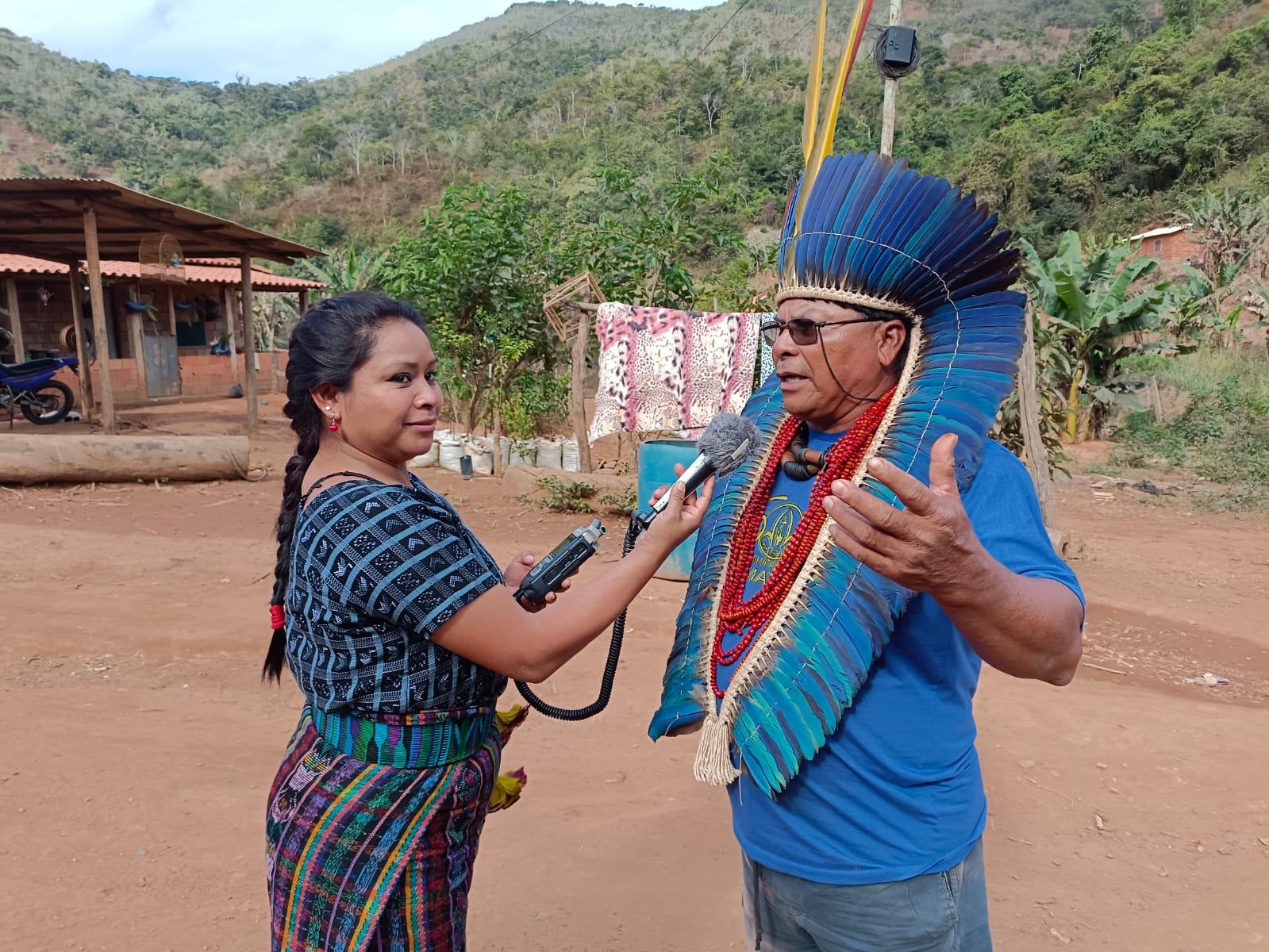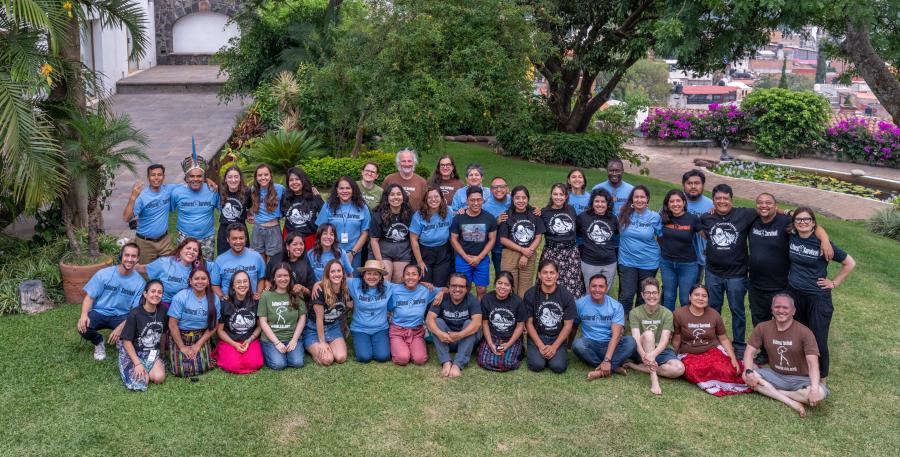
(February 13, 2025)-- On World Radio Day, Cultural Survival is celebrating 10 years of amplifying Indigenous people’s voices through the Indigenous Rights Radio Program (IRR).
Today marks the 14th annual celebration of World Radio Day, as proclaimed by UNESCO. On the first celebration of World Radio Day in 2012, former UN Special Rapporteur on the Rights of Indigenous Peoples James Anaya (Apache and Purépecha) emphasized the importance of community radio for the world's Indigenous Peoples, "Radio has been a fundamental means for Indigenous Peoples to maintain their languages and to exercise and defend their rights." In many parts of the world, despite the risk of police raids, jail time, threats, and even death for community journalists, community radio stations serve a vital function by distributing information about important news and educational programming like emergency disaster relief, voter registration, and public health campaigns. The power of radio reaches even the most rural areas, providing Indigenous communities with access to programming in their own languages and serving as a voice that promotes Indigenous cultures, traditions, and belief systems.
“Because knowledge is power,” Indigenous Rights Radio, a program of Indigenous Peoples’ rights organization Cultural Survival, uses the power of community radio to inform Indigenous communities of their rights. Cultural Survival’s team of Indigenous producers collect and produce stories from Indigenous Peoples worldwide in English, Spanish, and over 140 Indigenous languages. Since 2015, the Indigenous Rights Radio Program has been bringing the voices of the Indigenous Peoples around the world in a dynamic dialogue about the meaning of Indigenous Peoples' rights, their common struggles, and the innovative solutions they develop to deal with the problems they face. IRR produces educational radio programming for distribution reaching between 12-50 million listeners annually through the global network. The Indigenous Rights Radio website houses over 3794 podcasts and radio programs. The content is also available on several platforms, including Soundcloud, Spotify, Apple podcast, YouTube Music, Amazon Music, Podimo, Spreaker, iHeartRadio, Deezer, Podcast Addict, and Podchaser.
Through Indigenous Rights Radio, Indigenous radio producers from Cultural Survival bring the latest information on Indigenous Peoples' rights and how they are being implemented around the world. Programs are available for listening, downloading, and sharing for free. These include public service announcements, interviews, reports on international rights, and the strategies that Indigenous communities are using to make their rights a reality. Over the past 10 years, 1200+ radio stations worldwide have received IRR programs across 55 countries in 140+ languages. IRR produced and sourced over 610 Public Service Announcements on COVID-19 in 140 Indigenous languages.
Cultural Survival envisions a world in which Indigenous communities, equipped with the knowledge of their rights, are empowered to protect their lands, languages, and cultures.

Rosy Sul González (Maya Kaqchikel) interviewing Pataxó leader in Brazil.
Rosy Sul González (Maya Kaqchikel), Indigenous Rights Radio Program Manager, said, “Community radio led by Indigenous Peoples is part of the good living of our communities. Radio provides the opportunity to continue developing the capacities of men and women, to make spots, podcasts, and special programs in our own languages with topics that affect us, and also to share good practices in the care of the land and the territory, mainly, traditional medicine, food security, among others. Community radio is a tool that many communities can use and in turn be connected and exchange their cultures, leadership, and care of natural resources in their territories. Indigenous community radio is the voice and identity of our Peoples.”
“Community radio provides access to information in extremely rural areas and, for these communities, serves as a tool for local organizing, cultural and language revitalization, educational opportunities, information on lands and natural resources issues, women’s rights, and Indigenous rights. We are committed to uplifting Indigenous voices and information about Indigenous Peoples’ rights via Indigenous Rights Radio,” said Aimee Roberson (Chickasaw and Choctaw), Executive Director of Cultural Survival.
“Cultural Survival has been working with the Indigenous radio movement since 2005. Today, Indigenous-controlled media is needed more than ever, especially when mainstream media often overlooks and marginalizes Indigenous languages and issues. Daily, Indigenous radio journalists risk their lives to communicate essential information about human rights to their communities to defend their ways of life, lands, and resources. As an advocacy organization for Indigenous rights, it is our duty to support these efforts in claiming freedom of expression and access to information,” commented Mark Camp, Cultural Survival Deputy Executive Director.
Help celebrate IRR’s milestone by listening to and sharing our programs and podcasts.
Listen to IRR’s top 10 most listened-to programs:
- We Are Still Here- A Message of Unity For Thanksgiving
- Doctor Ruby Gibson on Somatic Archaeology
- 2019 Is The International Year of Indigenous Languages
- The Impact of Religion on Maasai Traditions And Culture
- Indigenous Peoples Day
- Jessica Hutchings on Hua Parakore
- UN Special Rapporteur discusses the impact of the Trans Pacific Partnership on Indigenous Peoples
- Indigenous Human Rights Defenders
- Many Voices, One Message - Traditional Knowledge Protects Mother Earth!
- What Is Sacred To Us Means Nothing To Them - Gary McKinney on Lithium Mining In Thacker Pass
About Cultural Survival
Cultural Survival works to implement Indigenous Peoples' right to establish their own self-determined communication platforms as enshrined in Article 16 of the UN Declaration on the Rights of Indigenous Peoples. In 2024, our Indigenous Community Media Fund supported 57 Indigenous communication projects benefiting Indigenous communities in 25 countries through $480,000 in grants, and our Indigenous Rights Radio program produced 174 radio programs and distributed them to over 800 radio partners across the globe. Our advocacy for Indigenous community media focuses on pushing for the democratization of radio frequencies by changing telecommunication laws in countries where Indigenous Peoples want to have their own radio stations and where they face criminalization for claiming their right to freedom of expression. We continue to push for the implementation of the 2021 Inter-American Court of Human Rights ruling related to community radio stations in Guatemala. For more information visit www.cs.org.



